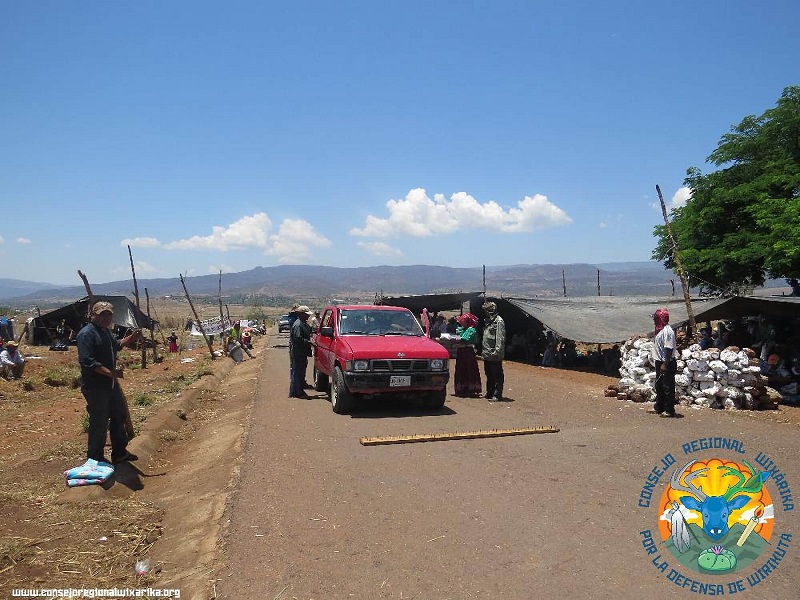
by Deep Green Resistance News Service | May 12, 2018 | Obstruction & Occupation
by Agustin del Castillo / Intercontinental Cry
Este artículo está disponible en español aquí
MESA DEL TIRADOR, Wixárika territories, Mexico — At midnight on May 10, 2018, members of the Wixárika (Huichol) community of Wuaut+a (San Sebastián Teponahuaxtlán), in the Western Sierra Madre of Mexico, took the dramatic step of blocking all entrances to their community, given the lack of response from the Mexican State for their demand to peacefully receive the lands that they have won from the ranchers of Huajimic in agrarian lawsuits.
Meeting in assembly in the Wixárika town of Mesa del Tirador, a few kilometers from the mestizo village of Puente de Camotlán, the communal and traditional authorities, together with the Regional Wixárika Council, declared in an official communiqué: “Today’s deadline for President C. Enrique Peña Nieto to appear before the community of Waut+a, was indicated in the Historical Statement made in Amolera on April 29 of the present year.
“In the control and surveillance post located in Mesa del Tirador, there is a group of 400 Wixaritari guarding the access in order to prevent passage by political operatives or others who have to do with the electoral processes; likewise we are seizing all electoral propaganda material.”
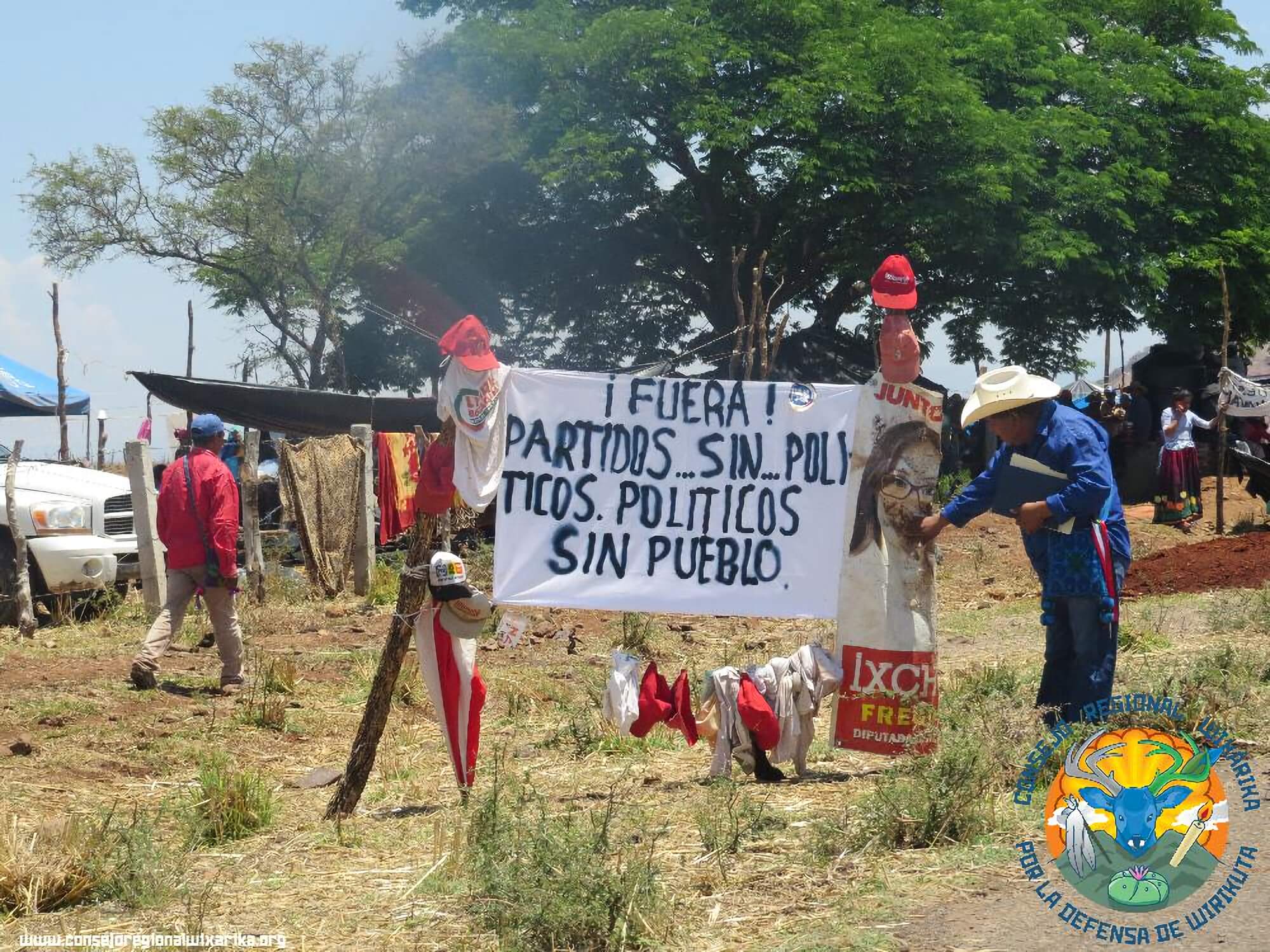
“Get out! Parties without politicians… Politicians without the People.” Mobilization in Mesa del Tirador expresses the frustration of Wixaritari with the political system. More than 7,000 Wixaritari from the community of Wuaut+a will not vote unless the situation regarding the return of ancestral lands from Huajimic is resolved. (Photo courtesy Wixárika Regional Council)
Three more roadblocks have been set up; one in Cerro de la Puerta, one in Las Cañadas (Banderitas or El Miguelón), and a third in El Pacheco. “The demand of the Wixárika community is a solution to the agrarian and border disputes between the states of Nayarit and Jalisco. The community demands that the President of the Republic present himself at the point where the state limits are located, at the limits of the two different worlds, If he fails to show up by the stated deadline, at 11:59 pm, the four surveillance posts will close the two roads to the general public: the Tepic-Aguascalientes highway (Mesa del Tirador-Las Cañadas), and the Carretera Huejuquilla – Amatitán (Cerro de la Puerta and El Pacheco). There will also be 35 schools closed, from preschool, primary and secondary, until the executive presents himself in the community of Waut+a; otherwise, will not vote on July 1 of 2018.”
The deadline passed without any government response, and the Wixárika closed the roads and the schools as promised. More than 7,000 Wixaritari from the community of Wuaut+a will refuse to vote, and they will block installation of the voting booths in the community.
“We are not going to give more votes to the political system we have in Mexico. I believe that all Mexicans no longer feel represented; we have a failed state, we have the absence of the rule of law and I think that it is not only the Wixaritari, who are suffering these legal failures in the Mexican State,” said Ubaldo Valdez, commissioned spokesman for the Surveillance Committee of Mesa del Tirador, Bolaños.
Despite the presidential absence, yesterday a meeting was held in Mexico City among representatives of the Ministry of the Interior, the Secretariat of Agrarian, Territorial and Urban Development, and the Secretaries of the Government of Jalisco and Nayarit (see below). They requested three days of extension for the community members for the next step of the protest, but the community assembly refused.
The consequences of a total closure to the circulation of the roads will have a significant economic impact, since they comprise the commercial routes between the Sierra of Nayarit and the Zacatecan highlands, and between the Bolaños canyon towns and the northernmost zone of Jalisco, Huejuquilla and Mezquitic.
“Many are looking at the the possibility that the community provide its own supplies, but it sounds complex because there are 36 main localities and it is a very vast territory and badly connected,” said one observer of the meeting.
The precedent of this dramatic measure was the action taken by the residents of Tuapurie, or Santa Catarina, another of the principal Wixárika communities, who closed the schools of the community for more than a month and blocked roads, until they were visited by the governor of the state, Aristóteles Sandoval, on October 31, 2017. In that case, there are demands for basic services, such as health and education, which are also part of the demands of Wuaut+a, whose central component is the return of their ancestral lands in Huajimic.
For the background on this ongoing land recovery struggle for the restitution of 10,000 hectares of ancestral Wixárika lands, see IC’s previous coverage on the issue.
Agreements in Mexico City
Representatives from the Ministry of the Interior (Segob), the Secretariat of Agrarian, Territorial and Urban Development (Sedatu), the National Commission for the Development of Indigenous Peoples, the Ministry of Finance and Public Credit and the Secretariats of the Government of Jalisco and Nayarit, met Wednesday in the capital of the country to determine the solution to the Gordian knot of the compensation to Huajimic landholders, the losers of the agrarian lawsuits in favor of the indigenous community of Wuaut+a.
Aldo Saúl Muñoz López, magistrate of the executing court, Agrarian Tribunal 56 of Tepic, told MILENIO JALISCO that during the past few days he had asked for reports of the files, but had not received until Wednesday night the expected call about the final route of money to defuse the conflict in the Sierra.
For his part, Roberto López Lara, secretary of the Government of Jalisco, published in his Twitter account: “In the case of the community of San Sebastián Teponahuaxtlán, a working group was set up where @SEGOB_mx, @ SEDATU_mx, @SHCP_mx and the states of Jalisco and Nayarit participated to follow up on the trial carried out by residents of this area.”
At the same time, the conflict in San Andrés Cohamiata, another northern neighbor of Wuaut+a, was addressed. The community has been threatened with territorial division to favor mining interests protected by Nayarit. “… between the @GobiernoJalisco and @NayaritGobierno, we recognized through an agreement, the integrity of the territory, the uses and customs of the Wixárika community of San Andrés Cohamiata”.
The next judicial executions in favor of Wuaut+a are scheduled by Agrarian Tribunal 56 for May 23 and 30, 2018.
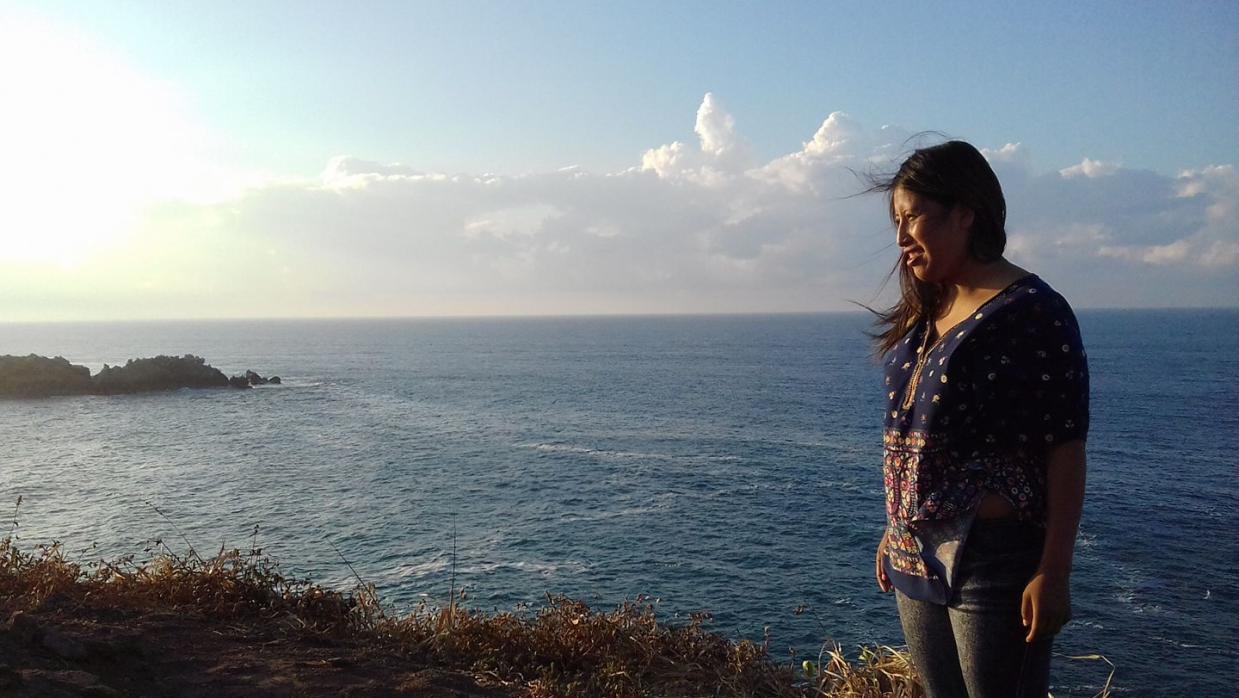
by Deep Green Resistance News Service | Feb 23, 2018 | Repression at Home
by Cultural Survival
Cultural Survival condemns the murder of the Purépecha environmental activist Guadalupe Campanur Tapia, whose body was found on January 16, 2018 in the municipality of Checrán, Michocán, Mexico. She was strangled to death by two unidentified killers. Investigators have not indicated that Campanur’s death was due to her activism, but they have not ruled it out either.
Threats of violence and violent acts against Indigenous human rights and environmental defenders, particularly women, is an increasingly widespread problem. Frontline Defenders reported that in 2017 they received reports on the murder of 312 defenders in 27 countries.
- 67% of the total number of activists killed were defending land, environmental and Indigenous peoples’ rights, nearly always in the context of mega projects, extractive industry and big business.
- 84% of murdered defenders received at least one targeted death threat prior to their killing.
Femicides, sadly common in the Mexico, have ended the life of a talented and passionate woman: a defender for women’s rights, Indigenous Peoples, and the environment. Campanur’s work earned her the admiration and respect from many in her Purépecha community, but she posed a threat to others.
Campanur died at a young age of 32 years old, leaving a legacy of courageous work that will continue to inspire her generation and future generations. In April 2011, she was among Indigenous leaders of Cherán, who rung the bell calling on people to defend their forests against against illegal and merciless logging. Organized crime groups had been operating in the area destroying the municipality’s natural resources with the aid of the corrupt local officials. Campanur was the only female member of the founding team of the Forest Rangers of Cherán, a community initiative that held community patrols in defense of the life in the forest. Her fellow rangers praised her bravery and dedication.
In the midst of the struggle to defend their lands and resources, the community of Cherán decided to claim their rights as Indigenous Peoples in self-government by electing representatives directly and independently from the costly and corrupt conventional elections, expelling politicians, policies and other state and organized crime authorities involved in corruption from their territory. Campanur contributed to creating one of the best functioning examples of self-government in Mexico. These changes also successfully reduced violence in the area, with the last murder occurring in 2012.
Friends of Campanur reported that she had stopped patrolling the forests, but remained involved in the reconstruction of Cherán’s communal territory and culture as well as social work. Campanur became a member of the community’s Concejo Mayor or “Great Council” which aims regulate and aid public life. Her work for seniors, children, and workers made her an icon in her community.
The Attorney General of the State of Michoacán has announced that a investigation is in process in coordination with the Federal Mechanism for the Protection of Journalists and Human Rights Defenders through the Secretariat of State Government.
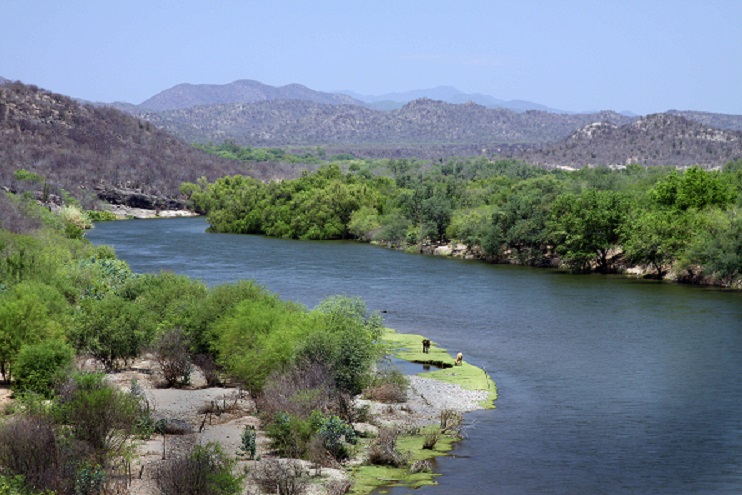
by Deep Green Resistance News Service | Jan 30, 2018 | Colonialism & Conquest
Featured image: The Aguaprieta pipeline crosses the Yaqui River (Río Yaqui), the water source for the Yaqui, an indigenous tribe residing in the Yaqui Valley in Sonora, Mexico. Photo: Tomas Castelazo (CC). As far as one Yaqui community is concerned, the pipeline will never be completed.
by Gabriella Rutherford / Intercontinental Cry
In 2013, Enrique Peña Nieto’s government deregulated Mexico’s energy sector, opening it up to foreign investors for the first time 75 years. In what he called an “historic opportunity”, the Mexican President proclaimed “This profound reform can lift the standards of living for all Mexicans.”
But not everyone stands to see their quality of life materially improve from the deregulated sector. Such is the case for the Yaquí Peoples in Sonora state, Mexico, whose territory is currently home to an 84-kilometre stretch of natural gas pipeline.
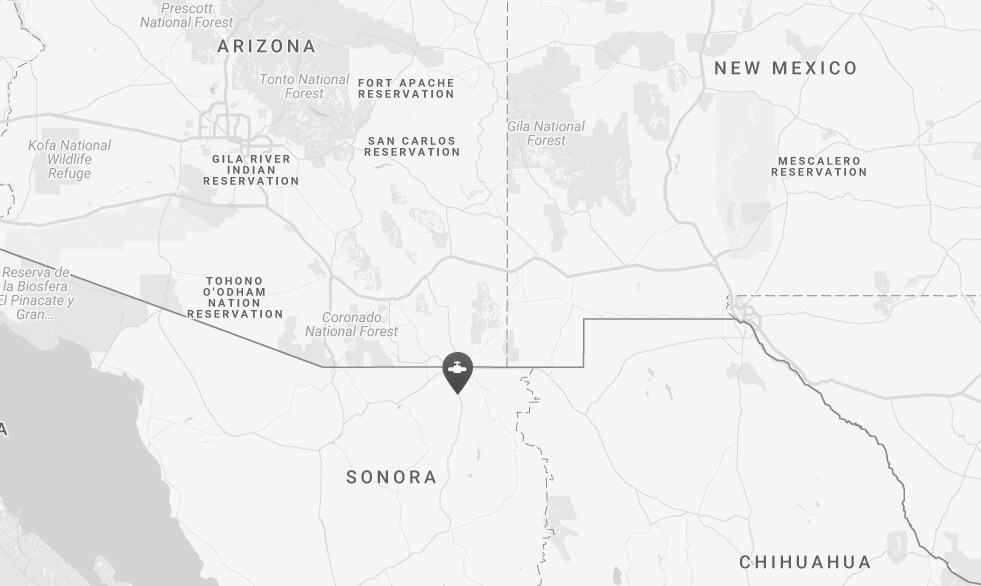
The Aguaprieta (Agua Prieta) pipeline starts out in Arizona and stretches down 833km to Agua Prieta, in the northeastern corner of the Mexican state of Sonora—cutting through Yaqui territory along the way.
Once completed, the pipeline would also cross Yaqui River (Río Yaqui), the Yaqui’s main source of water.
More than a few Yaqui are adamant that they will see no benefits from the project. “The gas pipeline doesn’t help us, it only benefits businessmen, factory owners, but not the Yaqui” said Francisca Vásquez Molina, a Yaquí from the Loma de Bacúm community.
As with Keystone XL and Dakota Access pipelines, the Aguaprieta project comes with its own share of risks.
In addition to the considerable environmental impact that stems from the pipeline’s construction, the high methane content of natural gas could bring on disaster. Rodrigo Gonzalez, natural resources and environmental impact expert, maintains that in the event of a gas explosion all human, plant and animal life within a one-kilometre radius surrounding the explosion would be lost. Anyone within the second kilometre would risk second and third-degree burns.
In the community of Loma de Bacúm, the gas pipeline is just 700 m from houses. In nearby Estación Oroz, it is 591m from a primary school.
Gonzalez has pointed out that another viable route for the pipeline was initially considered by the company that could have avoided Yaqui territory altogether. He suggests this route was ultimately rejected to save costs. “At the beginning of the project, two routes were mooted. That which didn’t cross indigenous territory cost 400 million pesos whilst that which puts Yaquí lives at risk costs 100 million pesos.”
IEnova, the company behind the pipeline, has repeatedly made assurances that all due safety procedures have been followed in construction and that the risk of accidents is minimal but this has not been enough to assuage the fear or anger of everyone opposing the gas pipeline.
In a public statement last year, the group Solidaridad Tribu Yaquí said, “This is a people that say no to a megaproject of death, dispossession and destruction[…]These rich men don’t care about the life of one, two, or three people, much less if they are indigenous… [they] don’t care if the Yaqui culture is exterminated. What is important to these rich men is to conclude the work and pocket all the profits to be brought about by the appropriation of the Yaqui territory.”
Not all Yaquí communities are united in rejecting the gas pipeline, however. Indeed, of the eight Yaquí communities consulted, only the Loma de Bacúm community refused to give their consent to the project. The other seven communities chose to accept the compensation offered. This decision has sadly resulted in tensions between Loma de Bacúm and the other communities. Things reached a critical point in October 2016 where one Yaquí member died and thirty injured in a confrontation involving different Yaquí communities.
Seemingly alone in their struggle, the Loma de Bacúm Yaquí have consistently resisted the Aguaprieta pipeline. In April 2016, they successfully fought to be granted a moratorium on its construction. When, in 2017, it became clear that IEnova, would carry on regardless and that neither federal nor state or authorities could be counted on for support, the Loma de Bacúm community resorted to more drastic measures. On May 21, community members removed cables which had been laid down in the preliminary stages of the gas pipeline construction. Then, after another court ruling that IEnova should remove all infrastructure within 24 hours fell on deaf ears, on August 22 the community went ahead and cut a 25-foot section out of the live gas pipeline, despite the grave risks they ran in doing so. As a result of the community’s actions in August, IEnova was forced to cut off the gas flow in the area and it has remained out of service ever since.
The community has been accused of sabotage and vandalism to IEnova property but the community maintains that IEnova, a company owned by US-based Sempra Energy, is trespassing on their land and holds them responsible for all damage brought on by the construction of a pipeline to which they never consented.
In a video shared on Facebook, one community member explained “If you want to have us killed, there’s no problem. We’re not scared of that… We’re not scared of this company nor this project…All that the Yaquí tribe is asking for is that the law is upheld and that federal and state government respect it. If you want to have us killed, go ahead there’s no problem but we’ll defend our land and that is our right.”
In September 2017, a judge once again found in favour of the Yaquí community ruling that IEnova did not have the right to enter Yaquí territory to repair the gas pipeline. Whether this latest ruling will carry more weight with both local and state authorities than the previous ones remains to be seen.
For the time-being, the stand-off looks set to continue. Loma de Bacúm has made it clear it will not back down until the pipeline is removed or rerouted. “If they want to build a pipeline. that’s fine”, said community spokesperson Guadalupe Flores, “but it will not pass through here.” At the same time, IEnova refuses to accept that one small community can curtail their plan to use Yaquí territory in order to provide electricity to the Comisión Federal de Electricidad (CFE), the country’s largest electric utility. Nor does it seem willing to brazenly defy the court’s latest ruling, at least for the time-being.
The struggle in Loma de Bacúm echoes loudly among all Indigenous Peoples who are grappling to make sure the resource sector cannot run roughshod over human rights and environmental concerns; but it is perhaps loudest in Mexico. Since the new energy policy went into effect, four other pipeline projects have been suspended. Looking ahead, a “shale offensive” is now set to begin later this year should the PRI retain power in July, leading to a proliferation of similar conflicts.
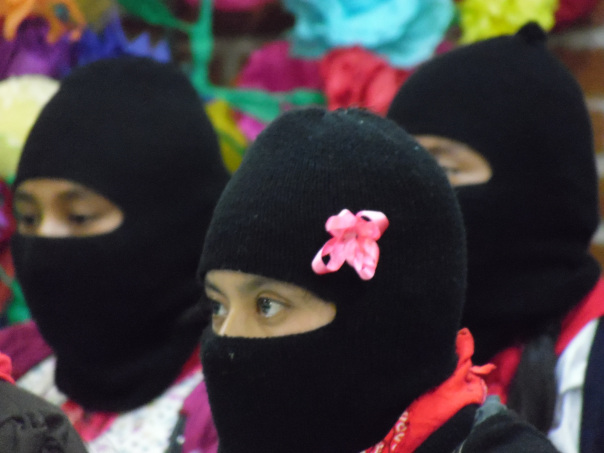
by Deep Green Resistance News Service | Jan 9, 2018 | Movement Building & Support
Featured image: Zapatista women convoke International Women’s Gathering.
by Chiapas Support Committee
CONVOCATION of the FIRST INTERNATIONAL GATHERING of POLITICS, ART, SPORTS, and CULTURE for WOMEN in STRUGGLE
Communiqué of the Indigenous Revolutionary Clandestine Committee, General Command of the Zapatista National Liberation Army
To the women of Mexico and the World:
To the original women of Mexico and the World:
To the women of the Indigenous Governing Council:
To the women of the National Indigenous Congress:
To the women of the national and international Sixth:
Compañeras, sisters:
We greet you with respect and affection as the women that we are—women who struggle, resist, and rebel against the chauvinist and patriarchal state.
We know well that the bad system not only exploits, represses, robs, and disrespects us as human beings, but that it exploits, represses, robs, and disrespects us all over again as women.
And we know that things are now worse, because now all over the world we are being murdered. And there is no cost to the murderers—the real murderer is always the system behind a man’s face—because they are covered up for, protected, and even rewarded by the police, the courts, the media, the bad governments, and all those above who maintain their position on the backs of our suffering.
Yet we are not fearful, or if we are we control our fear, and we do not give in, we don’t give up, and we don’t sell out.
So if you are a woman in struggle who is against what is being done to us as women; if you are not scared (or you are, but you control your fear), then we invite you to gather with us, to speak to us and listen to us as the women we are.
Thus we invite all rebellious women around the world to:
The First International Gathering of Politics, Art, Sport, and Culture for Women in Struggle
To be held at the Caracol of Morelia, Tzotz Choj zone of Chiapas, Mexico, March 8, 9, and 10, 2018. Arrival will be March 7 and departure on March 11.
If you are a man, you are listening or reading this in vain because you aren’t invited.
With regard to the Zapatista men, we are going to put them to work on all the necessary tasks so that we can play, talk, sing, dance, recite poetry, and engage in any other forms of art and culture that we want to share without embarrassment. The men will be in charge of all necessary kitchen and cleaning duties.
One can participate as an individual or as a collective. You can register at this email: encuentromujeresqueluchan@ezln.org.mx Include your name, where you are from, if you are participating as an individual or a collective, and how you want to participate or if you are just coming to party with us. Your age, color, size, religious creed, race, and way of being don’t matter; it only matters that you are a woman and that you struggle against the patriarchal and chauvinist capitalist system.
If you want to come with your sons who are still small, that’s fine, you can bring them. The experience will serve to begin to get it into their heads that we women will no longer put up with violence, humiliation, mockery, or any other fucking around from men or from the system.
And if a male over 16 years of age wants to come with you, well that’s up to you, but he won’t get past the kitchen here. He might be able to hear some of the activities and learn something though.
In sum, men can’t come unless a woman accompanies them.
That’s all for now, we await you here compañeras and sisters.
From the mountains of the Mexican Southeast,
For the Indigenous Revolutionary Clandestine Committee—General Command of the Zapatista Army for National Liberation and on behalf of all the girls, young women, adult women, and women elders, living and dead, councilwomen, Good Government Council women representatives, women promotoras, milicianas, insurgentas, and Zapatista bases of support,
Comandantas Jessica, Esmeralda, Lucía, Zenaida and the little girl Defensa Zapatista
Mexico, December 29, 2017
Originally Published in Spanish by Enlace Zapatista
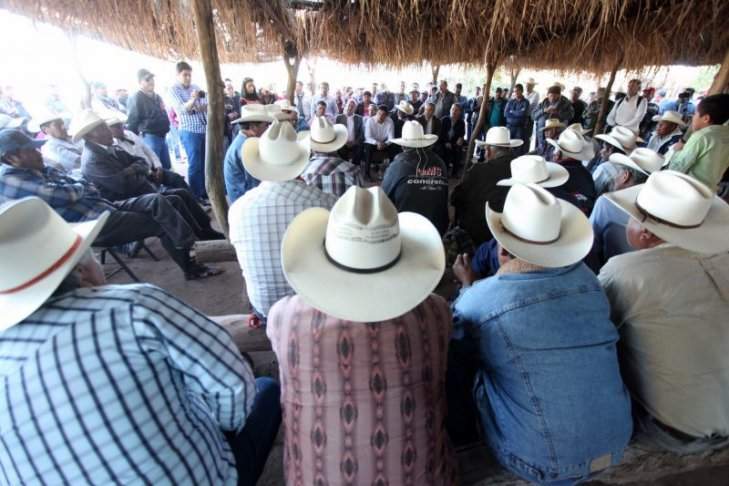
by Deep Green Resistance News Service | Jan 3, 2018 | Lobbying
Featured image: Yaqui community gathering Credit: Andrea Arzaba, CC BY–SA 4.0
by Steve Horn / DeSmog
Since Mexico privatized its oil and gas resources in 2013, border-crossing pipelines including those owned by Sempra Energy and TransCanada have come under intense scrutiny and legal challenges, particularly from Indigenous peoples.
Opening up the spigot for U.S. companies to sell oil and gas into Mexico was a top priority for the Obama State Department under Hillary Clinton.
Mexico is now facing its own Standing Rock-like moment as the Yaqui Tribe challenges Sempra Energy’s Agua Prieta pipeline between Arizona and the Mexican state of Senora. The Yaquis in the village of Loma de Bacum claim that the Mexican government has failed to consult with them adequately, as required by Mexican law.
Indigenous Consultations
Under Mexico’s new legal approach to energy, pipeline project permits require consultations with Indigenous peoples living along pipeline routes. (In addition, Mexico supported the adoption of the United Nations Declaration on the Rights of Indigenous Peoples, which includes the principle of “free, prior and informed consent” from Indigenous peoples on projects affecting them — something Canada currently is grappling with as well.)
It was a similar lack of indigenous consultation which the Standing Rock Sioux Tribe said was the impetus for lawsuits and the months-long uprising against the Dakota Access pipeline near the tribe’s reservation in Cannon Ball, North Dakota, in late 2016. Now, according to Bloomberg and Mexican reporter Gema Villela Valenzuela for the Spanish language publication Cimacnoticias, history is repeating itself in the village of Loma de Bacum in northwest Mexico.
Agua Prieta, slated to cross the Yaqui River, was given the OK by seven of eight Yaqui tribal communities. But the Yaquis based in Loma de Bacum have come out against the pipeline passing through their land, even going as far as chopping out a 25 foot section of pipe built across it.
“The Yaquis of Loma de Bacum say they were asked by community authorities in 2015 if they wanted a 9-mile tract of the pipeline running through their farmland — and said no. Construction went ahead anyway,” Bloomberg reported in a December 2017 story. “The project is now in a legal limbo. Ienova, the Sempra unit that operates the pipeline, is awaiting a judicial ruling that could allow them to go in and repair it — or require a costlier re-route.”
As the legal case plays out in the Supreme Court of Justice in Mexico, disagreements over the pipeline and its construction in Loma de Bacum have torn the community apart and even led to violence, according to Cimacnoticias.
Construction of the pipeline “has generated violence ranging from clashes between the community members themselves, to threats to Yaqui leaders and women of the same ethnic group, defenders of the Human Rights of indigenous peoples and of the land,” reported Cimacnoticias, according to a Spanish-to-English translation of its October 2016 story.
“They explained that there have been car fires and fights that have ended in homicide. Some women in the community have had to stay in places they consider safe, on the recommendation of the Yaquis authorities of the town of Bácum, because they have received threats after opposing signing the collective permit for the construction of the pipeline.”
TransCanada’s Troubles Cross Another Border
While best known for the Canada-to-U.S. Keystone XL pipeline and the years-long fight to build that proposed tar sands line, the Alberta-based TransCanada has also faced permitting issues in Mexico for its proposed U.S.-to-Mexico gas pipelines.
According to a December 2017 story published in Natural Gas Intelligence, TransCanada’s proposed Tuxpan-Tula pipeline is facing opposition from the indigenous Otomi community living in the Mexican state of Puebla. With Tuxpan-Tula, TransCanada hopes to send natural gas from Texas to Mexico via an underwater pipeline named the Sur de Texas-Tuxpan pipeline into the western part of the country.
The Otomi community recently won a successful bid in Mexican district court to stop construction of Tuxpan-Tula.
“At a recent hearing on an indoor soccer court at the foot of Cerro del Brujo, or Shaman’s Hill, in the southern Mexican state of Puebla, a district judge sided with an indigenous community and ordered construction” of the pipeline to halt, Natural Gas Intelligence reported. “[T]he court made the order in response to pleas from the local Otomi indigenous community, which claims that the construction would disturb sacred ground.”
Energy sector privatization in Mexico, decried by the country’s left-wing political parties and leading 2018 presidential contender Andrés Manuel López Obrador, has actually opened up the sort of legal opportunities that the Otomi have pursued in court.
“What is new in Mexico is the requirement that indigenous communities should be consulted,” Ramses Pech, CEO of the energy analysis group Caraiva y Asociados, told Natural Gas Intelligence. “That kind of consultation has long been a part of any project in the U.S. and other countries, but not so here. It was obviously needed in Mexico, too, but it has added to the complexities of the Mexican legal system in areas such as land and rights of way.”
In the U.S., the tribal consultation process is governed by the National Historic Preservation Act’s Section 106. That law gave the Standing Rock Sioux Tribe standing to sue U.S. government agencies, though ultimately unsuccessfully, for what the tribe alleged were violations which took place during the inter-agency permitting process.







